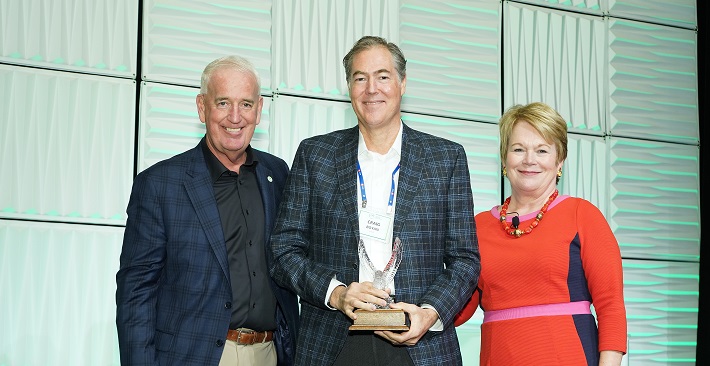Although the food retail industry is changing at a rapid pace, some of the basic tenets of good customer service and making employees a priority will never go out of style. The winners of FMI – The Food Industry Association’s Executive Leadership Awards were unveiled at the association’s recent Midwinter Executive Conference, and each honoree shared their take on what it means to be a great leader in today’s evolving food marketplace.
Employees make a company great
For H-E-B President Craig Boyan, the way to win at food retail is to invest in people, which H-E-B does by making its employees owners in the company. “Winning through people is going to be the answer,” he said, adding, “We really believe that our stores and our people are the most inspired in retail.”
“For me a strong leader is someone that gives their people empowerment to discover new things and to learn from their mistakes and to explore the future,” said Kevin Davis, chairman and co-CEO of grocer Bristol Farms.
Empowering employees is also something that PepsiCo North America CEO Al Carey believes in. “I think the real mark of leadership is helping develop people to places maybe they didn’t think they could get to,” he said.
Carey believes the front line of the industry is the people who get up early every day and carry the heavy load. “They get the work done and they’re the most important people in the company,” he said. “I believe in investing in that because if you do, and you have an inspired group of front-line employees, they’ll knock down obstacles that you never dreamed you could get knocked down.”
Festival Foods President and CEO Mark Skogen invests in his associates by offering teaching and coaching opportunities. The company quizzes employees and teaches them things in their area of the store, while also communicating messages about the business. “That’s one way that we try and communicate and keep them engaged and growing and learning, so that maybe this is a job that turns into a career for them at some point,” he explained.
The customer still comes first
An emphasis on great customer service is still king when it comes to successfully leading a company, and retired president of W. Lee Flowers & Co. Henry Johnson says customer service requires doing the same things that have always been done. “Clean stores, full shelves, nice people — all of that still matters,” he said.
Indeed, “It’s still about being good to people, meeting their needs, exceeding their needs, listening to them, admitting you’re wrong and trying to satisfy each guest we come into contact with.” Skogen explains.
Davis believes it can still be difficult to create lasting customer relationships. “For me, that’s one of the biggest challenges in our industry is to build that relationship with your customers such that they don’t even care if somebody comes down the street and opens a new store because they’re not going to move away from the relationship they’ve built with you.”
A guiding principle for Carey is to always keep an ear open to consumer concerns and desires. “I think by listening you find out what’s really important to your customer and then you tailor your company’s approach to their needs so you can solve the problems they’ve got,” he explained.
Looking to the future, Natalie Menza-Crowe, director of health and wellness for ShopRite, believes that even as digital channels grow and expand, customer service and human interaction will be crucial to keeping shoppers coming back.
Community remains important
Community, in many different forms, continues to be important for industry leaders. Being involved and making an impact, Skogen explained, is something both leaders and their employees can appreciate. “It feels good to give back,” he said. “It’s fulfilling to give back. I always say that it’s not all that fulfilling to put a case of peas on the grocery shelf.”
“I think it’s always been in our DNA to care about our customers, care about our associates and care about our community partners,” Menza-Crowe said. Putting dietitians in stores, she believes, has been a huge testament to her company’s commitment to community.
“I believe a rising tide lifts all ships, so anything that we can do to make our communities better helps everybody,” Johnson said.
Likewise, Carey understands that being a part of the community in any aspect is a win-win for both leaders and employees. “The legacy I hope to leave in food retail is one of helping people,” he said. “Trying to help as many people as we can not only lifts them up, it lifts us up.”
Related stories:
- CPG companies capitalize on brand recognition with collaborations
- Where does the grocery industry stand on food waste initiatives?
- Retailers, restaurants tap into a powerful resource that’s in their employees’ own pockets
_____________________________________
If you enjoyed this article, sign up for FMI dailyLead or the GMA SmartBrief to get news like this in your inbox, or check out all of SmartBrief’s food and travel newsletters as we offer more than 30 newsletters covering the food and travel industries from restaurants, food retail and food manufacturing to business travel, the airline and hotel industries and gaming.
